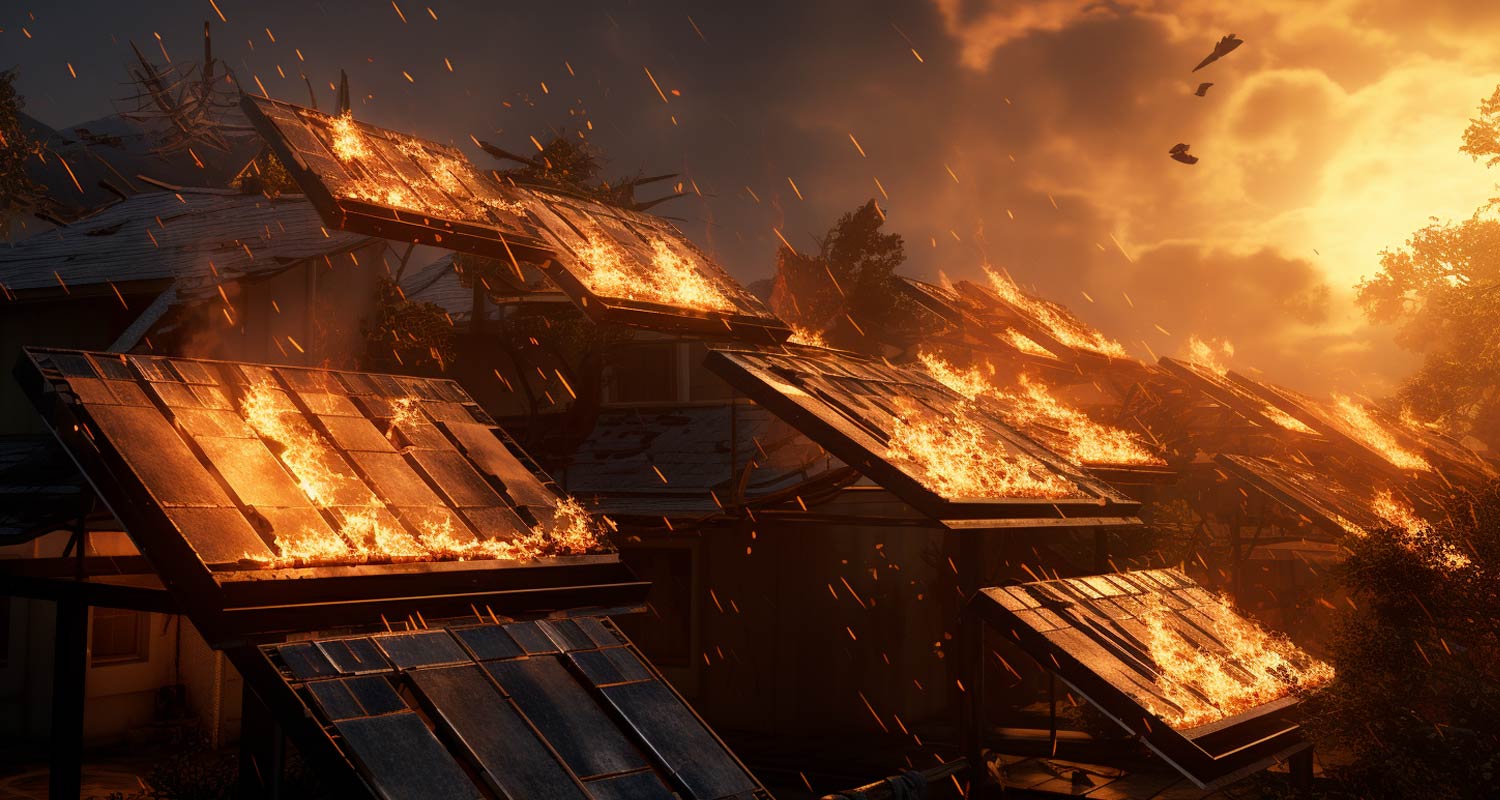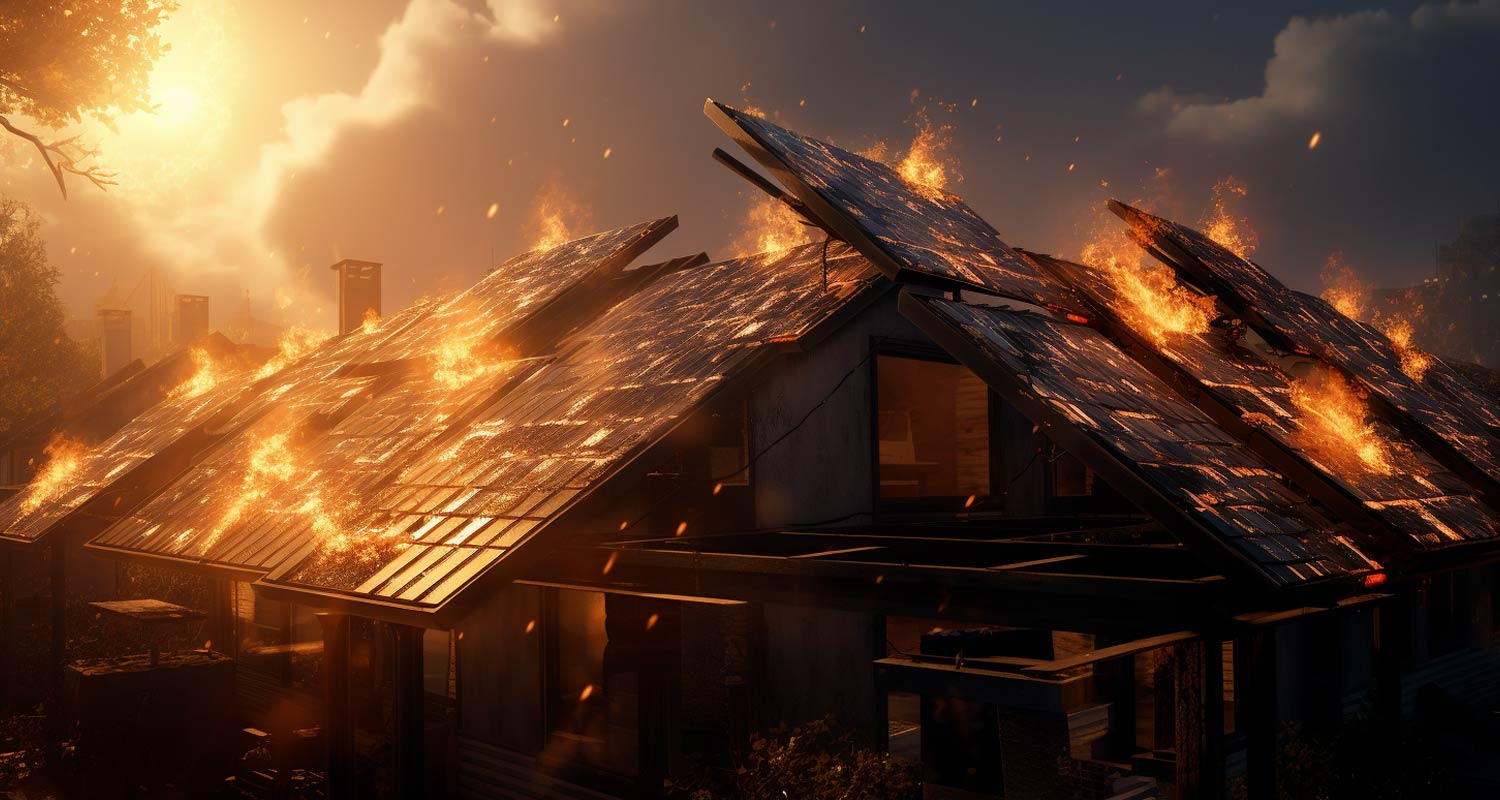 Solar has become a popular choice for South Africans wanting to overcome load shedding. But is it a fire risk?
Solar has become a popular choice for South Africans wanting to overcome load shedding. But is it a fire risk?
Just last week, a fire broke out at Vodacom Group’s Western Cape headquarters in Cape Town and, according to MEC for safety & security JP Smith, as the first teams arrived at the scene they discovered that the solar panels installed on the roof had started the blaze. Vodacom didn’t confirm this.
Smith said: “The incident adds to a series of fires caused by alternative energy installations.”
Ironically, a week before, Cape Town had issued a warning about the risks of installing alternative energy solutions. Smith recommended that those who have already adopted alternative solutions should have their systems inspected regularly for any signs of electrical fatigue or mechanical breakdown, and consider additional preventive measures despite the potential increase in the initial installation cost.
With more South Africans looking to deploy solar thanks to the South African Revenue Service’s tax rebates on solar panels, concerns about the propensity for poorly installed systems to catch fire are growing.
Gaylor Montmasson-Clair, a senior economist at non-profit Trade & Industrial Policy Strategies, said recently that imports of solar panels have surged in recent months. In the first quarter, R3.6-billion worth of solar panels were imported, three times as much as the previous quarter. In the whole of 2022, R5.6-billion of solar panels were imported, with the figure set to be surpassed in the second quarter of 2023.
Various risks
However, there are various risks involved with installing solar panels, one of the main ones being fire.
“Using thicker-diameter cables is advisable to minimise resistance and prevent heat accumulation,” said Cape Town’s Smith. “The maximum ratings of components, including those of inverters, batteries, solar panels and all connecting components should be carefully considered.”
Old Mutual subsidiary Elite Risk Acceptances MD Tarina Vlok told the Citizen in June that fire is the “very real risk property owners face when a solar power solution is not installed in line with regulations and South African national standards”.
Old Mutual, she said, has noted an increase in the number of fire-related claims due to incorrect installations.
Vlok used a recent claim to illustrate how devastating the consequences of incorrectly fitted or maintained solar panels can be. “The fire in this particular case was caused by the installation of charge controllers, which was done without a professionally authorised design document in accordance with the manufacturer’s instructions. The issuing of a certificate of compliance did not comply with the relevant code that deals with the wiring of installations,” she said.
 For those who live in complexes, or who own commercial or business properties in shared sectional title premises, there are several rules that need to be considered when installing solar energy. The regulation and installation of alternative power supplies falls under the control of homeowners associations and sectional title bodies corporate, managed under the Sectional Titles Schemes Management Act.
For those who live in complexes, or who own commercial or business properties in shared sectional title premises, there are several rules that need to be considered when installing solar energy. The regulation and installation of alternative power supplies falls under the control of homeowners associations and sectional title bodies corporate, managed under the Sectional Titles Schemes Management Act.
The act is very specific about the manner in which common property must be managed – and approval is vital before solar panels are fitted to individual properties.
MD of insurance broker IntegriSure Sandro Geyser told TechCentral that the requirements for commercial premises differ depending on the type of business being pursued. Ordinary administrative functions in an office will obviously have different requirements from premises where flammable liquids are stored, for instance, and there are all sorts of conditions for insuring solar panels that must be adhered to.
But once insurance has been taken out, whatever the system (grid tied, solar panels with an inverter, or batteries, for instance) and assuming a qualified installer has been used, with a certificate of compliance issued, there should be no problem with cover, he said.
“Of course, the kind of insurance selected depends on many things,” said Geyser. “Does load-bearing capacity have to be taken into account, and does there need to be underwriting or extra excesses because of the nature of the business? Is it a large factory with a roof covered with panels, in which case extra provisions or excesses might have to be included?
Many bodies corporate are either unaware, or have not been informed, that they can include solar panels in their existing building insurance policies
“But if all the requirements are in order, a compliance certificate has been issued and the policy is paid up, then there is no reason why the insured peril – in this case, fire – should not be paid out if cover for it has been elected. Of course, some people elect not to insure for fire, but that I cannot explain,” Geyser said.
Many bodies corporate are either unaware, or have not been informed, that they can include solar panels in their existing building insurance policies. There are several available options for bodies corporate looking to insure rooftop solar systems, one option being to increase the building sum insured by the system’s replacement value. The solar system would be fully covered for standard building risks such as fire, hail, impact and accidental damage.
Homeowners living in residential estates or complexes must obtain approval from their respective bodies corporate before installing solar panels. Discussions at AGMs need to inform members about the coverage provided for solar panels as well as any exclusions or potential limitations.
“It goes without saying that solar systems must be installed by a qualified, accredited installer capable of issuing a certificate of compliance. Insurance companies and manufacturers may reject claims if the system is not installed by an accredited professional. Reputable solar installers should have liability coverage,” Geyser said.
Regular maintenance
Gosolr CEO Andrew Middleton said his company has installed solar at thousands of sites and has never experienced any instances of fires breaking out, although he said it “can obviously happen” in instances where an installer does poor electrical work.
“Then there is also the question of maintenance. It’s all very well to make sure the panels are properly installed and signed off – in fact, a certificate of compliance is a legal requirement. Regular maintenance is very important.
“Then, of course, your solar installation definitely needs to be insured against all the usual risks – fire, hail, etc – and for that you need your certificate of compliance. Fitting solar panels is a surefire way to deal with the problem of load shedding, but the process has to be followed and correctly implemented.” — © 2023 NewsCentral Media

